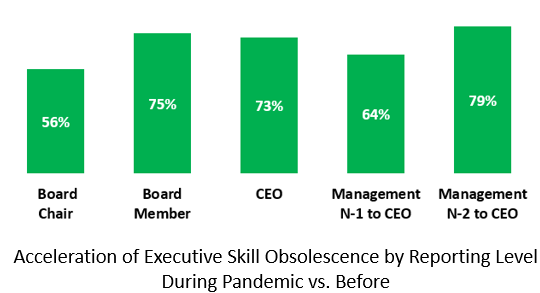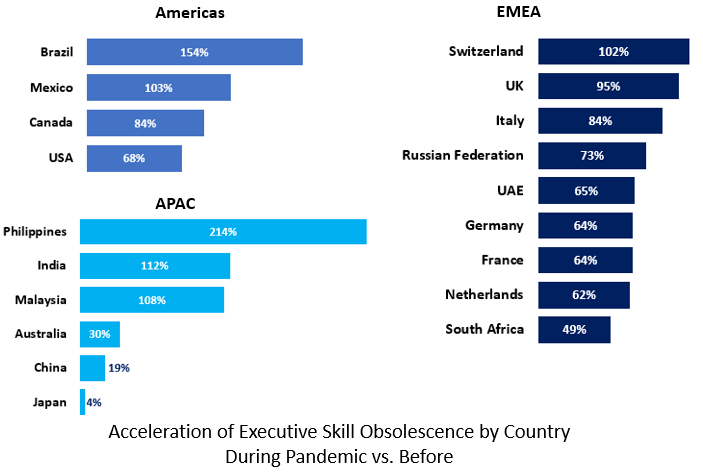Boris Groysberg and Katherine Connolly Baden
Harvard Business School
Even in the best times, executives routinely experience some level of challenge with skill obsolescence.
Organizational leaderships keeps evolving
This is simply the nature of organizational leadership in the 21st century; some skills necessary to do the job evolve, change, or sometimes become obsolete and keeping up is a challenge.
The rate of skill obsolescence, however, can increase even more rapidly in times of crisis, when executives are challenged to lead in unpredicted and sometimes unprecedented ways.
Skill obsolescence has accelerated
The COVID-19 pandemic gave us the opportunity to study the effects of a global crisis on executive skills and skill obsolescence.
In order to learn more, we partnered with The Official Board to conduct a survey of 3,026 executives from countries on every continent except Antarctica.
Respondents represented 53 key functions and 86 industries primarily in the banking, insurance, financial services, consulting, and telecommunications sectors.
Based on the quantitative data, we found, the average rate of skill obsolescence has increased by 71.7 percent during the pandemic.
Example: An executive estimated his or her speed obsolescence skills were 5% a year before the pandemic and 8% a year during the pandemic. His or her speed of skill obsolescence has increased with a rate of (8% – 5%) / 5% = 60% that can be visualized as his or her acceleration of skill obsolescence.
The following are our findings by corporate reporting levels and functions:

The variance among responses, we found, reflects the differences due to a range of situational factors, such as country, function and industry:

Executive skill obsolescence has accelerated globally. Yet, not everyone experienced it equally.
How can executives increase their relevance?
After unearthing the extensive increase in skill obsolescence due to the pandemic, we turned our attention to what executives can do to regain, maintain, and even increase their relevance.
Of course, traditional means of remaining relevant, such as reading or attending conferences (even if only virtually) remain important.
Five strategies that executives may not yet have considered:
1. Formalize your plan
Formalize the process by creating a written document outlining your plan to stay relevant. Include goals, actionable steps and timelines based on your own assessment and that of others’.
2. Surround yourself
Surround yourself with people who help keep you relevant. Use the “Great Recession” as an opportunity to fill vacancies (at least partially) through this lens.
3. Use social media
Use social media as a tool to identify and funnel relevant information and knowledge right to your device from people who have valuable insights to offer.
4. Remain a producer
Continuing to produce for your company will help you maintain your relevance and also encourage others to see you as a relevant leader.
5. Take time to assess
Take time to assess and learn from the real-time consequences of your decisions and actions, both good and bad.
Get ready for your next challenge
Using these strategies will help executives stay relevant not only in the face of COVID-19, but also when dealing with other crises, including those they face now and will face in the future.
See our full piece in Newsweek to learn more about what individual executives reported and additional details on these strategies.
More on the survey
The survey asked two quantitative questions: 1. On average, what percentage of your skills became obsolete or outdated – during – the pandemic? 2. On average, what percentage of your skills became obsolete or outdated on a yearly basis – before – the Pandemic?
In addition to quantitative data, we collected qualitative data in the form of text responses from 84 percent of respondents.